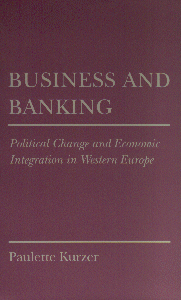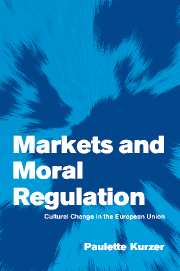
Focusing on labor-business-government relations in Sweden, Belgium, the Netherlands, and Austria, Kurzer argues that the increasing transnationalism of corporations, especially financial institutions, is undermining the power of smaller European governments and central banks to set and enforce social policy. Also shows that the conditions are similar in the four countries, though the process is further along in Belgium and the Netherlands. (Book News, Inc., November 1, 1993).

Markets
and Moral Regulation:
Cultural
Change in the European Union
ISBN: 0521003954, Paperback
Price: $21.00
Description
Does European integration influence national cultures and social policies?
Is Europe’s fabled cultural diversity diminishing? Paulette Kurzer examines
these important and topical questions by comparing the Irish abortion ban,
Finnish and Swedish drinking restrictions, and Dutch drug decriminalization.
Employing a synthesis of constructivist and institutionalist theories,
Kurzer demonstrates that domestic shifts in values and attitudes, spurred
along by the impact of EC/EU market integration, are in fact bringing about
a convergence in European morality norms. Alcohol control policies are
forced to liberalize, the Irish abortion proscription is being redefined,
and Dutch drug toleration is pushed into a more punitive direction. Markets
and Moral Regulation argues that a crucial agency is European law and its
role as a market regulator: as market forces invade these cultural and
moral spheres, protective barriers disintegrate. The result is that cultural
and social domains are increasingly exposed to the influence of market
competition.
Chapter Contents
1. Markets versus morality;
2. Binge drinking: the evolution of Finnish alcohol policy;
3. Our greatest problem: the evolution of Swedish alcohol policy;
4. Nordic morality meets the European union;
5. Permissive pragmaticism: Dutch drug policy;
6. Harm reduction meets the EU: from public health to public order;
7. Irish sexual morality versus European sexual permissiveness;
8. The emergence of an European morality?